Faces of Open Government: Siti Juliantari Rachman
Rostros del gobierno abierto: Siti Juliantari Rachman
Siti Juliantari “Tari” Rachman has been an anti-corruption advocate in Indonesia for 10 years. In this interview, Tari shares how her interest in fighting corruption began and how she’s currently supporting Indonesia’s OGP commitmentOGP commitments are promises for reform co-created by governments and civil society and submitted as part of an action plan. Commitments typically include a description of the problem, concrete action... to open up contracting information and publish emergency procurement information on the national procurement portal.
You’ve been working at Indonesia Corruption Watch for 10 years. What inspired you to start that career path?
I was born into a poor family. When I was growing up, elementary and secondary educationAccountability within the public education system is key to improving outcomes and attainment, and accountability is nearly impossible without transparent policies and opportunities for participation ... was not free in Indonesia. From a young age I was always reminded that if I wanted to go to school, I had to go to a public school because there was no money for private schools. Therefore, I always tried hard to get good scores on my entrance exams in order to attend a public school.
When I was in high school, I met a student who entered school after the school year had started. While it is legal for the school to accept new students once the school year has already started, we suspected that the parents had donated air conditioning for the classrooms. I stayed silent at that time because I felt I couldn’t do anything.
After a few years, the same thing happened again. This time the school accepted a new student because it was suspected the payment given was greater than the usual entrance fee. Again, at that time I could only feel angry and could not do anything.
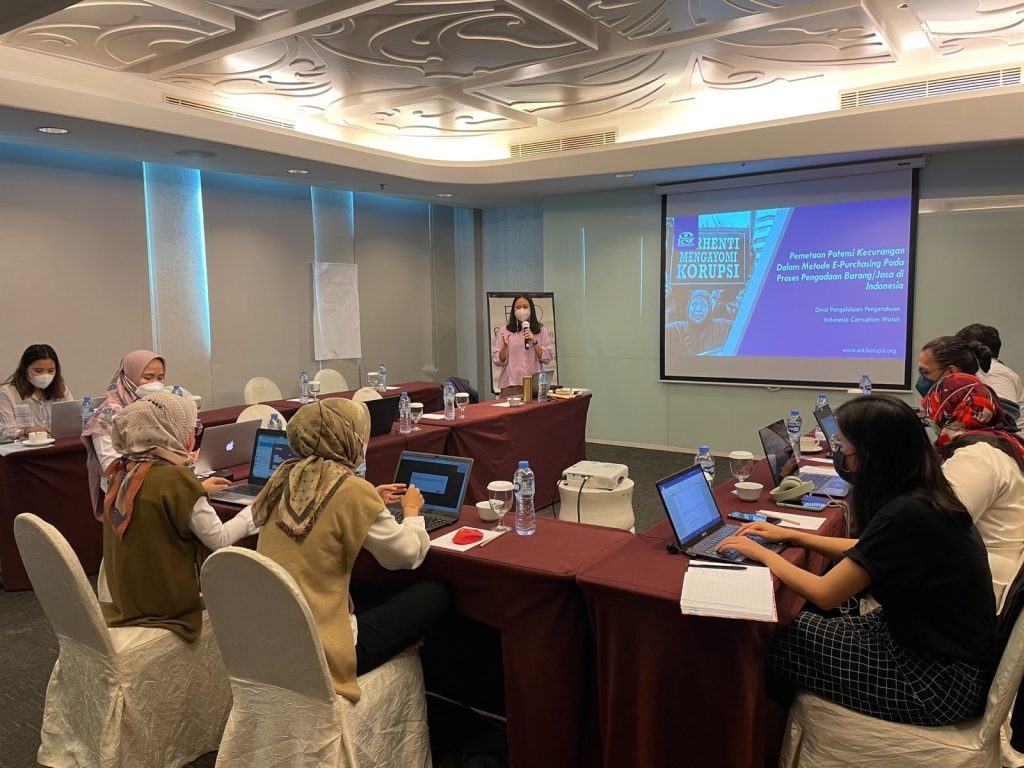
Tari facilitates a group discussion on potential fraud of procurement in e-purchasing in Indonesia. Participants were from the National Public ProcurementTransparency in the procurement process can help combat corruption and waste that plagues a significant portion of public procurement budgets globally. Technical specifications: Commitments that aim t... More Agency (LKPP) and Indonesia Corruption Watch.PHOTO: Credit: Wana Alamsyah, Indonesia Corruption Watch
This experience made me realise that corruption is close to us. Corruption is not only carried out by officials with positions that are often seen on television. Corruption in schools is a sad thing. Schools are supposed to promote anti-corruption values but can be places of corruption themselves. Corruption in the education sector not only results in state loss, but it also hinders access to education especially for poor people, worsens inequality, and leads to poor infrastructure.
From there, I became interested in the issue of corruption. I began to explore it when I joined Indonesia Corruption Watch as an intern in 2012.
I don’t know if this is a coincidence or destiny, but I was placed in the public service division, where one of the campaign issues was corruption in education. I began to understand how corruption happened in the education sector. The most common corruption is related to the procurement of goods and infrastructure. How can children get a good education if the school building, books, lab equipment, and operational fund are all corrupt?
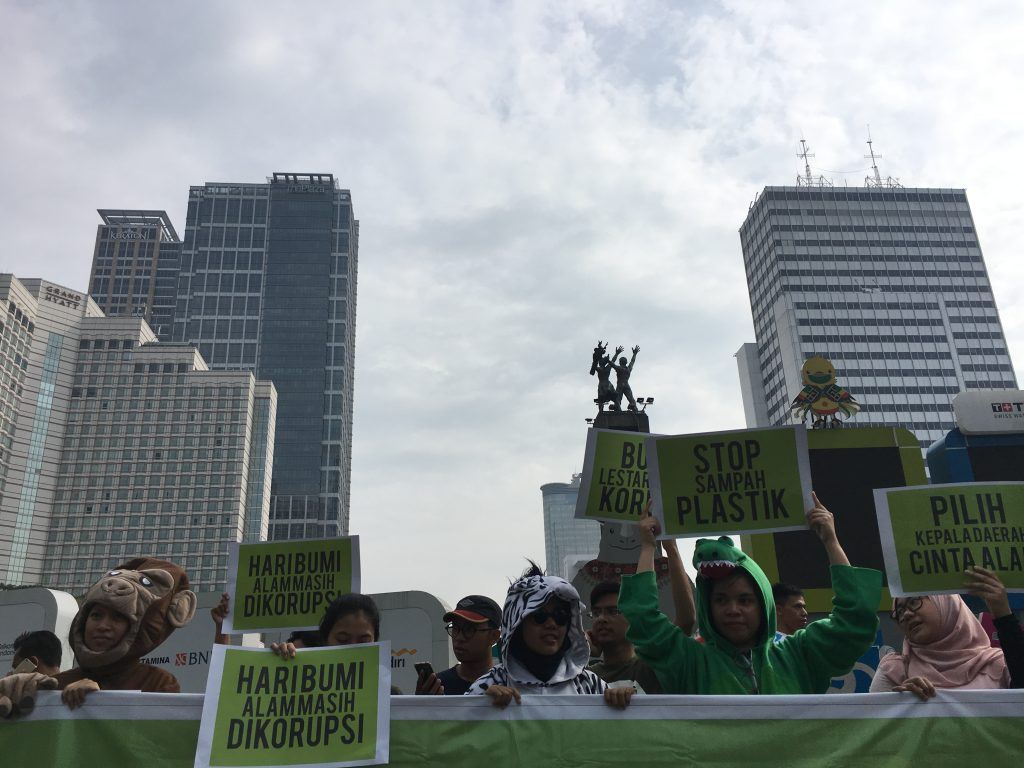
Tari and others join a demonstration on Earth Day to remind the public and the government that corruption in natural resources is still a big issue.PHOTO: Credit: Indonesia Corruption Watch
Each year, Indonesia loses about 4 billion USD through public procurement corruption. Through your organization’s support, Indonesian reformers are now opening up access to public procurement information through a commitment in their latest OGP action planAction plans are at the core of a government’s participation in OGP. They are the product of a co-creation process in which government and civil society jointly develop commitments to open governmen.... How do you hope this reform can change that corruption narrative? What changes have you observed in the course of co-implementing this reform with government reformers?
Opening up public procurement information does not immediately eliminate the potential corruption. However, disclosing public procurement information is the first step in providing information to the public about government spending and providing space for the public to monitor public procurement. It also gives business actors access to better understand government needs and know how to participate in the public procurement.
With the disclosure of procurement information, Indonesians can use the data to build procurement monitoring tools such as Opentender.net. This tool displays all public procurements and their potential fraud score. The higher the score, the higher the potential for fraud. This tool also helps the inspectorate supervise procurement. Monitoring initiatives such as Monitoring Marathon (Monithon), an event where people monitor public procurement in 24 hour and report the finding to LKPP’s complaint handling mechanism, began to emerge. In fact, government procurements that look odd often go viral on social media and encourage the government to explain the purpose of the procurement or eliminate the procurement, such as procurement of curtains for the official houses of members of the House of Representatives that are valued at Rp 43.5 trillion (US$2.98 million). This procurement went viral on social media and news because of the amount of money allocated for it.
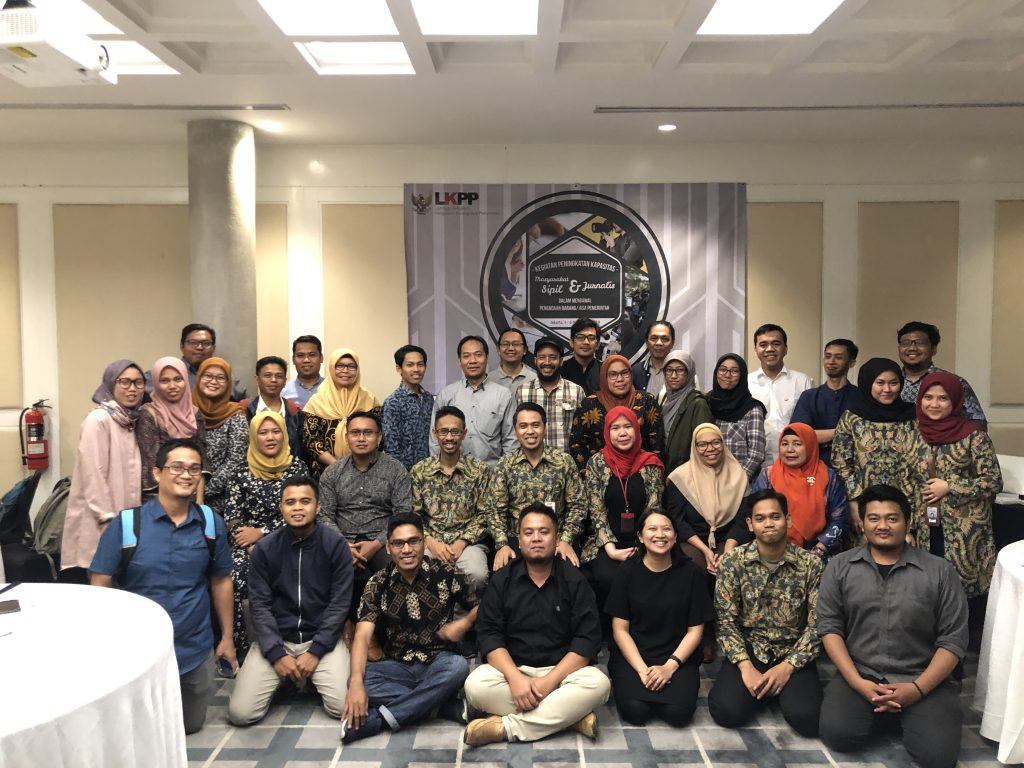
Indonesia Corruption Watch and the National Public Procurement Agency (LKPP) hosted a training about monitoring public procurement for CSOs and journalists.PHOTO: Credit: Indonesia Corruption Watch
Walk us through your role in its implementation. What lessons have you learned so far that could help other reformers in the community implementing similar reforms? What opportunities do you see in the future?
Advocating for proactive information disclosure in the procurement sector is a huge lift. A lot of information is expected to be disclosed by the government. We need to implement the reforms step by step to ensure success. For example, if we request that all procurement information be disclosed right away, this might make the government or national public procurement agency resistant and feel that too much needs to be done. Therefore, we can gradually encourage the government to open their procurement information. For example, in one year’s action plan, we could focus on encouraging transparencyAccording to OGP’s Articles of Governance, transparency occurs when “government-held information (including on activities and decisions) is open, comprehensive, timely, freely available to the pub... More in the procurement planning process, then in the following year on the selection process, and so on.
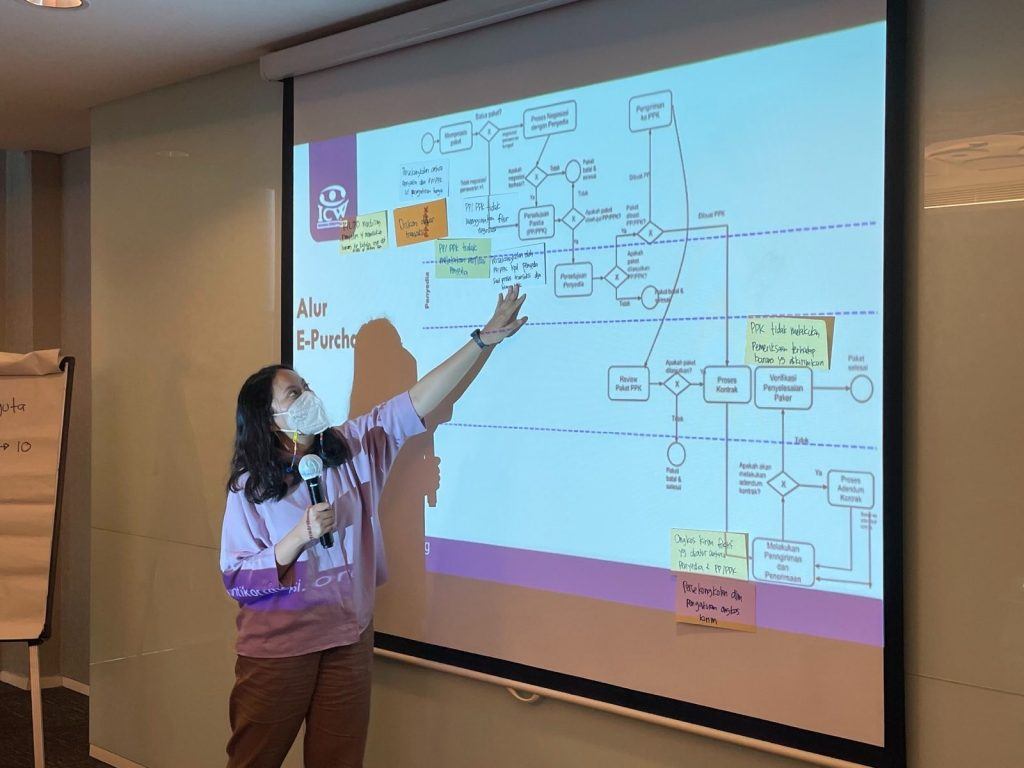
Tari presents the process of e-purchasing and its potential fraud.PHOTO: Credit: Wana Alamsyah, Indonesia Corruption Watch
There are several factors for successfully implementing an OGP action plan. First, there must be a strong relationship between government institutions and civil society before pushing out the OGP action plan. This shows that the relationship is not only transactional but fruitful. Some issues can only be resolved together through the OGP process.
Second, you need a commitment from top-level and mid-level leadership. Mid-level leaders will carry out more intensive communication, but top-level leadership must also support the activities being carried out.
Third, hold a forum or meeting outside of the main OGP co-creation meetings. While the OGP Indonesia meetings bring reformers inside and outside of government together, they don’t always provide sufficient time to discuss the challenges and achievements of reforms included in the country’s OGP action plans.
Last, ensure mutual openness between the parties involved. Open in terms of the challenge as well as progress in achieving the action plan, and availability of resources. For example, Indonesia Corruption Watch and the National Public Procurement Agency (LKPP) agreed to build capacity for the community. The resources needed to carry out this activity were also discussed together, who is responsible for the place, transportation, and others.
The Indonesian government has made many changes in terms of promoting open contractingA transparent procurement process, known as open contracting, increases competition, improves public service delivery, and ensures governments better value for their money. Technical specifications: C... More in public procurement. This includes a clearer policy about information disclosure in procurement and a system that supports the publication of procurement information. However, there is still homework that needs to be done to strengthen transparency in procurement and encourage community participation, for example publishing more detailed procurement information, such as the specification of good or service.
Siti Juliantari “Tari” Rachman ha sido una activista contra la corrupción en Indonesia por diez años. Tari comparte cómo comenzó su interés en combatir la corrupción y cómo apoya el compromiso de OGP de Indonesia de abrir la información de contratación y publicar información de adquisiciones de emergencia en el portal nacional de adquisiciones.
Has trabajado en Indonesia Corruption Watch desde hace diez años. ¿Cuál fue tu inspiración para iniciar esta carrera?
Yo nací en una familia pobre. Cuando era niña, la educación primaria y secundaria no era gratuita en Indonesia. Desde muy pequeña, siempre me decían que, si quería ir a la escuela, tenía que ir a una escuela pública porque no teníamos dinero para pagar una escuela privada. Por lo tanto, siempre me esforcé mucho por obtener buenos resultados en los exámenes de admisión para poder asistir a una escuela pública.
Cuando estaba en secundaria, conocí a un estudiante que entró a la escuela cuando ya había iniciado el ciclo escolar. Aunque la escuela tenía permitido admitir a nuevos estudiantes una vez iniciado el ciclo escolar, sospechamos que su familia había donado equipos de aire acondicionado para los salones. Yo guardé silencio porque sentía que no podía hacer nada.
Años después ocurrió lo mismo. En esta ocasión, la escuela aceptó un nuevo estudiante porque aparentemente hizo una contribución mayor a la cuota normal. Nuevamente, sentí enojo por no poder hacer nada.

Tari facilitando una discusión de grupo sobre potenciales fraudes en las adquisiciones electrónicas de Indonesia. Las y los participantes son representantes de la Agencia Nacional de Adquisiciones Públicas (LKPP) y de Corruption Watch.PHOTO: Credit: Wana Alamsyah, Indonesia Corruption Watch
Esta experiencia me hizo entender lo cerca que está la corrupción de la gente. La corrupción no solo ocurre en los funcionarios que vemos en la televisión. La corrupción en las escuelas es triste, pues éstas deben promover valores anticorrupción, pero muchas veces en ellas se registra actos corruptos. La corrupción en el sector educativo no genera pérdidas para el estado, sino que además limita el acceso a la educación para las personas empobrecidas, exacerba la desigualdad y debilita la infraestructura.
Desde entonces, me interesó el tema de la corrupción y empecé a explorarlo más cuando entré a Indonesia Corruption Watch como becaria en 2012.
No sé si es una coincidencia o el destino, pero me colocaron en la división de administración pública, en donde uno de los temas era la corrupción en la educación. Ahí, empecé a entender cómo ocurre la corrupción en este sector. Los casos más comunes ocurren en la adquisición de bienes y de infraestructura. ¿Cómo pueden los niños tener acceso a educación si las escuelas, libros, laboratorios y fondos para la operación están envueltos en corrupción?

Tari y otras personas en una manifestación el Día de la Tierra, recordando a las personas y al gobierno que la corrupción en los recursos naturales aún es un problema.PHOTO: Credit: Indonesia Corruption Watch
Cada año, Indonesia pierde cerca de 4 mil millones de dólares por corrupción en las compras públicas. A través del apoyo de tu organización, las y los reformadores de Indonesia están abriendo el acceso a la información de las compras públicas a través de un compromiso que incorporaron en el plan de acción más reciente de OGP. ¿Qué cambios has observado en el proceso de coimplementación de esta reforma con reformadores de gobierno?
La apertura de la información de adquisiciones no elimina la corrupción automáticamente. Sin embargo, es el primer paso para dar a la ciudadanía información sobre los gastos de gobierno y ayuda a crear un espacio en el que la gente tiene la oportunidad de monitorear las compras públicas. Además, otorga a las empresas la posiblidad de atender las necesidades de gobierno y cómo participar en las licitaciones.
Con la publicación de información sobre compras, las personas de Indonesia pueden utilizar estos datos para crear herramientas de monitoreo como Opentender.net. Esta herramienta muestra todas las adquisiciones con una calificación de fraude potencial. A mayor puntaje, mayor potencial de fraude. Además, esta herramienta ayuda al cuerpo de inspectores a supervisar las adquisiciones. Así, empezaron a surgir iniciativas de monitoreo como el Maratón de Monitoreo (Monithon), un evento en el que las personas pueden monitorear las compras públicas durante 24 horas y reprtar sus hallazgos a la LKPP. De hecho, las compras de gobierno que tienen alguna irregularidad se vuelven virales en redes sociales, exhortando al gobierno a explicar el objetivo de la compra o eliminarla, como en el caso de la adquisición de cortinas para las casas oficiales de la Cámara de Representantes con un costo de 43.5 billones de Rp (US$2.98 millones). Esta compra se volvió viral en redes sociales y en los medios por el monto asignado.

Indonesia Corruption Watch y la Agencia Nacional de Adquisiciones Públicas (LKPP) organizaron una capacitación sobre monitoreo de las compras públicas para OSC y periodistas.PHOTO: Credit: Indonesia Corruption Watch
Explícanos cuál ha sido tu papel en la implementación del compromiso. ¿Qué lecciones has aprendido que pueden ayudar a otros reformadores de la comunidad a implementar reformas similares? ¿Qué oportunidades ves para el futuro?
Impulsar la transparencia proactiva de información en el sector de adquisiciones implica un gran trabajo. La expectativa es que el gobierno publique una gran cantidad de información, pero si le pedimos que toda la información solicitada sea publicada inmediatamente, el gobierno podría pensar que es demasiado trabajo. Por lo tanto, podemos pedirle publicar información gradualmente. Por ejemplo, en el plan de acción de un año puedes enfocarte en la transparencia del proceso de planeación de las adquisiciones y el próximo año en el proceso de selección.

Tari presentando el proceso de adquisiciones electrónicas y sus posibles fraudes.PHOTO: Credit: Wana Alamsyah, Indonesia Corruption Watch
Hay varios factores que son necesarios para implementar un plan de OGP de forma exitosa. Primero, debemos tener una relación sólida entre las instituciones de gobierno y la sociedad civil antes de impulsar un plan de acción de OGP. La relación no debe ser solo una transacción sino realmente tener frutos. Algunos temas solamente pueden ser resueltos en conjunto a través del proceso de OGP.
Segundo, debes tener compromiso de alto nivel y por parte de los mandos medios. Con los medios mandos se establece una comunicación más constante, pero es necesario contar con el respaldo de los altos mandos.
Tercero, establecer un foro fuera de las reuniones de cocreación de OGP. OGP Indonesia reune a reformadores de dentro y fuera del gobierno, pero no siempre tienen suficiente tiempo para discutir los retos y logros de las reformas planteadas en los planes de acción de OGP.
Finalmente, asegurar la apertura mutua entre las partes involucradas, tanto en los retos como en los avances hacia el cumplimiento del plan de acción y la disponibilidad de recursos. Por ejemplo, Indonesia Corruption Watch y la Agencia Nacional de Adquisiciones Públicas acordaron que era necesario desarrollar las capacidades de la comunidad. Los recursos necesarios para llevar a cabo esta actividad se discutieron en conjunto, incluyendo la responsabilidad del sitio, transporte, etc.
El Gobierno de Indonesia ha promovido muchos cambios en cuanto a contrataciones abiertas en las adquisiciones públicas, incluyendo la publicación de una política sobre transparencia de información y un sistema que respalda la publicación de las adquisiciones. Sin embargo, aun hay mucho trabajo por hacer alrededor de la transparencia de las adquisiciones y en promover la participación comunitaria, por ejemplo, la publicación de información más detallada como especificaciones de los bienes y servicios.
Comments (1)
Leave a Reply
Related Content

Indonesia
Indonesia’s seventh action plan includes promising commitments on open contracting, access to justice, and combatting sexual violence. The implementation period offers an opportunity for targeted efforts to strengthen high-level government…

Anti-Corruption in OGP
Corruption harms everyone by taking tax dollars from needed public services and projects. For OGP members, fighting corruption is essential to transparent, responsive, and inclusive government.
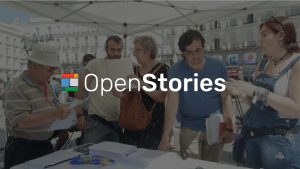
OpenStories
Everyone has a story. Together we have a mission. Explore stories from across the open government community, and submit your own.

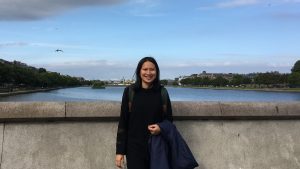
Gladys Estela Riveros Rojas Reply
Primero: la corrupción, es vista como un acto normal, la misma ocurre por la falta de principios y/o valores desde el núcleo familiar.
Segundo: la participación de las instituciones gubernabilidad da realce, unión y oportunidad para el Estado.
Tercero: Legalidad, transparencia y participación ciudadana son la base para un Estado Democratico.